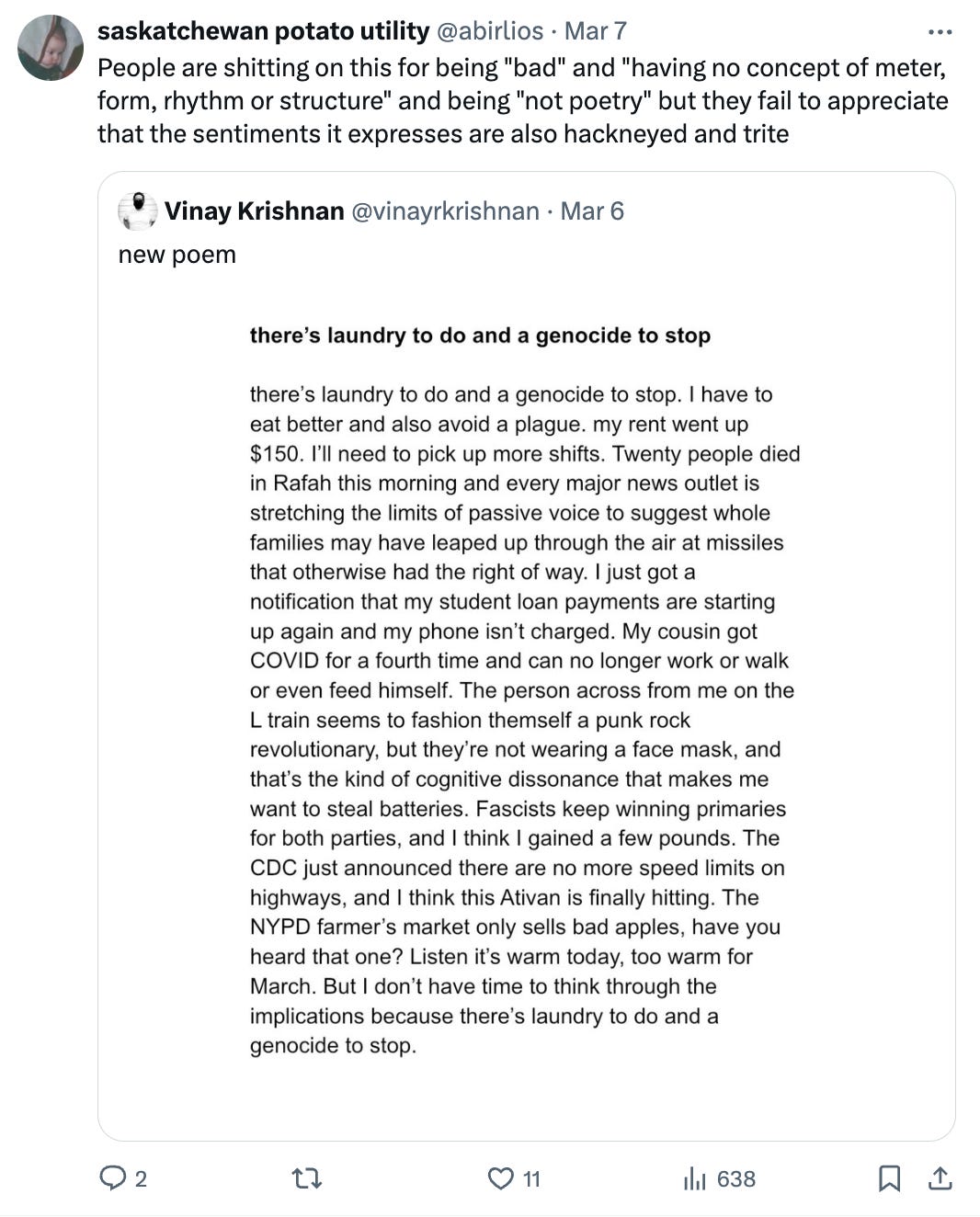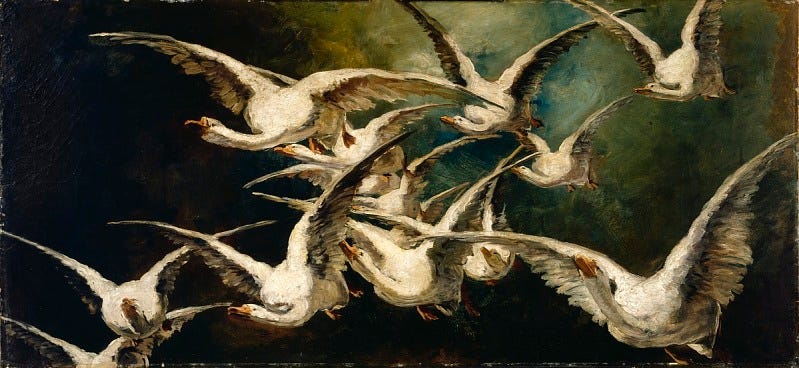I am going to say something about Mary Oliver
I think about a 2007 essay by George Saunders a lot.
In “The Braindead Megaphone,” he suggests that media and culture are ruled by the lowest—and loudest—common denominator.
For example, he suggests, imagine you’re at a cocktail party. Everyone is having side conversations and little discussions, in small groups and pairs, but then a guy walks in with a megaphone and starts shouting drivel. You may not want to talk about what he’s talking about, but he has the megaphone, and so now whatever he’s yelling about is the only thing on everyone’s mind. Whatever is coming out of the megaphone is what everyone is talking about now.
Saunders was critiquing broadcast journalism, which sounds quaint today, but he presaged the flood that followed: the devastating impact of the internet and social media on public discourse and how we’ve been deformed by our iPhones and a president and political ecosystem made by and for this kind of idiotic mass consumption monoculture.
What does the voice coming out of the megaphone sound like? Saunders says:
“But if we define the Megaphone as the composite of hundreds of voices we hear each day that come to us from people we don’t know, via high-tech sources, it’s clear that a significant and ascendant component of that voice has become bottom-dwelling, shrill, incurious, ranting, and agenda-driven. It strives to antagonize us, make us feel anxious, ineffective, and alone; convince us that the world is full of enemies and of people stupider and less agreeable than ourselves; is dedicated to the idea that, outside the sphere of our immediate experience, the world works in a different, more hostile, less knowable manner.”
This is self-evident now, on every social app and TV show, that it’s almost not worth saying. But I wasn’t prepared for the realization that the Braindead Megaphone has even come for poetry, sacred poesy!
Glorious lyricism has also been sacrificed on the Megaphone’s altar. I’m thinking about Saunders again whilst pondering what passes as popular poetry these days.
I am no poetry critic, let it be said; I can barely tell you what poems are for. I’m even married to a very good poet, and I am still mystified. But I like to read it and ponder it.
Despite my lack of personal investment in poetry, I am strangely aggrieved by the most popular poems. The stuff that’s hot on Instagram and X? It is nigh unbearable. It’s all that Saunders says: shrill, incurious, ranting, and agenda-driven.
Is it pretentious to say so? Is it haughty to say that Rupi Kaur writes bad poems? That Mary Oliver generated self-righteous nature sermons with line breaks, slapped on some therapizing questions, and called it a poem?
Maybe! And I don’t care!
After I heard Krista Tippett read a Mary Oliver poem at Nick Cave (who was not, let it be said, impressed), I felt a little sad for him and her. There are so many better poems out in the world! Why waste our one wild and precious life on the bad ones?1
Later that same week, I spent time with Ilya Kaminsky’s Dancing in Odessa and was alive with thought and insight and feeling. And it was not coerced, like it is with Rupi or Mary; it did not have to be beaten into my head; it did not have to be spelled out, as if to a small child.
Hasn’t it always been thus? The cheap, the bad, and the profligate are popular. Whether it’s a president or a poem, we love the lowest common denominator. It suits us. It’s easy to ingest until the next braindead missive catches our fractured attention.
I don’t know why I feel so goaded by bad poetry. I am not a poet. I have never wanted to be one (I just like being with one).
But I’m so sensitive about bad poems, even more than bad novels. There are thousands of bad novels, many of which are wildly popular, and I don’t mind them. Keep churning them out, reading them by the pool, and selling them in airport kiosks! I don’t mind! There are many worse forms of distraction and entertainment!
But a bad, popular poem feels like a slap in the face. Every word is supposed to count for so much in a poem, and when it’s cheap, it feels disrespectful to all language and human thought. (I know; I can hear myself; I’m absurd.)
When so much poetry can give us a glimpse into the eternal, it’s mildly horrifying to see everyone praise poetry that gives us, instead, a glimpse of our own reflection in a puddle.
There’s something so much better and deeper poetry out there: The sky is broader, the universe is vaster than we can imagine! As Mary says:2
And have you too finally figured out what beauty is for?
And have you changed your life?
HAVE YOU?? God. She kills me.
We did not spend our days gazing into each other’s eyes
Speaking of poets, I was moved by one very good poet (Donald Hall) reflecting on his marriage to another very good poet (Jane Kenyon).
Looking back on their two decades of marriage, before Kenyon died at 47, Hall says:
“We did not spend our days gazing into each other’s eyes. We did that gazing when we made love or when one of us was in trouble, but most of the time our gazes met and entwined as they looked at a third thing. Third things are essential to marriages, objects or practices or habits or arts or institutions or games or human beings that provide a site of joint rapture or contentment. Each member of a couple is separate; the two come together in double attention.”
The two come together in double attention!

I feel this very much in my own marriage to a poet. Guion and I will celebrate our 15th anniversary in a few weeks, in Vienna, and I am thinking about this charge from Donald and Jane.
Children are very obviously a third thing that we have, a very absorbing and demanding third thing, and there are three of them, but there are so many other third things we share: literature, theological curiosity, the tending of plants, the pursuit of the perfect dinner party, art-museum-going, the cultivation of incredible senses of humor… must I go on? The list is long and ever-growing.
As I age, and as our years of marriage wind on, I realize that seeking—the restless, creative, intellectual, curiosity-lit pursuit—is a primary driver of desire and connection. Guion shares this impulse, which is partially why the well has not yet run dry between us.
Donald and Jane had poetry and ping-pong and pets, but he writes of the effort and the change that their marriage had to sustain. Even these third things are not static. Even these shared joys must be tended. What a gift to be called into such daily work with a lover.
In conclusion
I was reminded of the Chauvet-Pont d’Arc cave while reading a book about plagues this week, and I can’t stop thinking about it.
I am beginning to be able to tell how much time a person spends on their phone within about 5 minutes of sustained conversation.
In the early morning, I saw what I thought was a dog sitting calmly in the neighbor’s garden, and then I realized it was a fox, who was then joined by her three (adorable!!) tumbling kits, and I felt like I was in a magical nature documentary smack in the middle of this scrambled city.
A colleague sent me a Slack message yesterday: Cedar waxwings in the serviceberry tree out front! And I thought, ah, even though we don’t talk often, he knows me so well. I ran out and found him sitting quietly on the front porch, having identified them by sound alone.
The complex mind feels increasingly like the ancient mind: a mind able to dispassionately hold two paradoxes at once and not collapse.
Currently reading
Come Together, Emily Nagoski
Pathogenesis, Jonathan Kennedy
Pew, Catherine Lacey






Thank you! I haven't read nearly as much poetry as you have, so I'm not at all qualified to comment much, BUT I believe that if a poet can't be great, she should at least have a sense of humor, should give us some hint that she doesn't take herself too seriously. It's easy to preach and nag.
And seriously, if you wrote your poem in one draft while sitting on your 18-minute subway ride, IT SHOWS.
Oh, I feel so shamed for keeping a Mary Oliver poem in my interior coat pocket! But you know something might be lowest-common-denominator level when you see a bumper sticker that says "Honk if you're letting the soft wild animal of your body love what it loves." I have also noticed a weird onslaught of poetry in my LinkedIn feed lately (I assumed many of them were song lyrics).